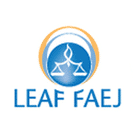LEAF is disappointed in the majority’s decision in Tanudjaja v. Attorney General (Canada), released by the Ontario Court of Appeal (ONCA) on December 1, 2014. (For background on the right to housing application and our intervention, please go here.)
LEAF argued before the ONCA in May, 2014, that novel arguments in Charter applications require a full hearing on the merits rather than being struck on a preliminary motion. We argued that the lower court’s interpretation of the test for a motion to strike (i.e. whether it was ‘plain and obvious’ that the application could not succeed) was an error of law.
In addition, we disputed Justice Lederer’s interpretation of s.15(1) of the Charter, specifically the issue of homelessness not being an analogous ground, the scope for positive obligations, how to address complex forms of inequality, and how such interpretations affect the determination that it was ‘plain and obvious’ that no such Charter rights exist and that the application could not succeed.
The majority of the ONCA did not engage with what we believe to be the central question of the appeal: the proper test for motions to strike. The majority decided that the application was not justiciable and “demonstrably unsuitable for adjudication” (para 36).
The dissent by Justice Feldman, by contrast, found that the “application raises significant issues of public importance” and that “it is neither plain nor obvious that the appellants’ claims are doomed to fail” (para 43). She notes that a motion to strike is intended “to weed out, at an early stage, claims that have no reasonable chance of success” but that such a motion “should not be used … as a tool to frustrate potential developments in law.” (para 49)
Justice Feldman states at para 52:
In my view, there are four problems with the motion judge’s approach: 1) he misunderstood the appellants’ s. 7 claim and stated it in an overly broad manner; 2) he erred in stating that the s. 7 jurisprudence on whether positive obligations can be imposed on governments to address homelessness is settled; 3) he erred in purporting to define the law in a critical area of Canadian jurisprudence on a motion to strike; and 4) most importantly, he erred in concluding that the issue of whether the appellants had a potential claim under s.7 could be decided without considering the full evidentiary record.
She completes her reasons with the following determination at para 88:
This application is simply not the type of “hopeless” claim for which Rule 21 was intended. It has been brought by counsel on behalf of a large, marginalized, vulnerable and disadvantaged group who face profound barriers to access to justice. It raises issues that are basic to their life and well-being. It is supported by a number of credible intervening institutions with considerable expertise in Charter jurisprudence and analysis. The appellants put together a significant record to support their application. That record should be put before the court.
Our intervention illustrates precisely why our voice as a leading Charter rights organization is essential – LEAF is the only one of the eight interveners that directly addressed the test for the motion to strike under Rule 21 and the importance of not striking novel Charter claims on a preliminary motion. As we stated in our factum:
Litigating novel and contentious claims has been critical to the development of section 15(1) jurisprudence and has directly affected the ability of individuals to advance substantive equality claims. If novel section 15(1) claims are struck on the basis of novelty alone, the effect will be to deny individuals access to Charter-based protections and to impede the progress of equality rights jurisprudence.
Our litigation expertise provided a vitally important analysis for the Court in its deliberations and shows why our work remains necessary in this era of governments using litigation tactics to silence valid rights-based arguments.
LEAF supports the applicants as they seek leave to appeal the ONCA decision to the Supreme Court of Canada. We believe the underlying application raises important issues about the critical lack of access to affordable housing in this country and the resulting vulnerability of women at all stages of our lives. Based upon our 29 years of experience in assisting courts with the interpretation and application of equality rights under the Charter, LEAF also believes that the dismissal of this application on a motion to strike sets a dangerous precedent for equality-seeking groups who resort to Charter litigation when all other avenues for seeking justice have been closed.
LEAF is grateful to Norton Rose Fulbright for their donation of pro bono legal representation in Tanudjaja. Without the assistance of counsel Vasuda Sinha, Rahool Agarwal and Lauren Posloski, we would not have been able to appear in this profoundly important case.
UPDATE: On June 25, 2015, the SCC denied leave to appeal in Tanudjaja. For more information, see ACTO’s statement here.
Since 1985, LEAF has assisted the courts in numerous cases with the interpretation and application of equality rights under the Canadian Charter of Rights and Freedoms. LEAF’s mandate has also driven its active involvement in matters of public policy and law, particularly with respect to issues involving human rights and discrimination. Please support LEAF’s work and make your 2014 tax-deductible charitable donation today.

